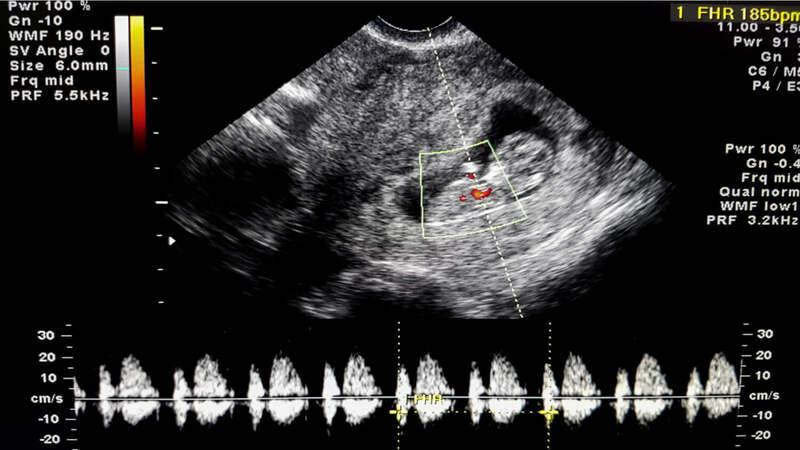
Once you share the exciting news of your pregnancy, you’ll likely encounter various claims about predicting your baby’s gender through simple signs. People will share all sorts of stories and myths, including old wives’ tales about whether you’re having a girl or a boy. These tales have been passed down through generations and are mostly entertaining, though they lack scientific evidence to predict baby’s gender.
Common myths range from the size of the mother’s breasts to the fetus’s position and the speed of the fetal heart rate. While hearing your baby’s heartbeat for the first time is incredibly reassuring, that rhythmic thump-thump cannot determine your baby’s gender. In this article, we will explore if one can predict baby’s gender from the fetal heart rate.
Video – Is There A Connection B/W Fetal Heart Rate & Baby’s Gender?
What is Fetal Heart Rate?
Fetal heart rate (FHR) is exactly as the name suggests. It is the heart rate of your fetus inside your womb. It is measured during your prenatal checkups by a radiologist or gynaecologist. While generally, Fetal Heart Rate ranges from 110 beats per minute (bpm) to 160 bpm, this range varies depending on the gestation period (1). Current international guidelines of the Federation Internationale de Gynecologie, (FIGO) recommends that a normal range of fetal heart rate is between 110 to 150 bpm (2).
[Read: Your Baby’s Heartbeat – Everything You Need to Know]
Understanding Fetal Heart Rate
 Measuring the fetal heart rate from time to time helps in assessing the well-being of the fetus [3]. Irregularities in the heart rate can predict certain complications, like low oxygen levels in the baby [4]. Mild fluctuations from the baseline are quite common.
Measuring the fetal heart rate from time to time helps in assessing the well-being of the fetus [3]. Irregularities in the heart rate can predict certain complications, like low oxygen levels in the baby [4]. Mild fluctuations from the baseline are quite common.
Fluctuations between 6 and 25 bpm per minute over ten minutes are considered normal. Electronic fetal monitoring helps determine the fetal heart rate, which can be done both externally and internally [5]. Any other irregularities beyond this require further monitoring.
Fetal Heart Rate in Different Weeks
The baby’s heart starts beating around 5 to 6 weeks, and at this time it is roughly similar to the mother’s [6]. This time onwards, the rate starts increasing by about three beats per minute per day during the first month. During the last ten weeks of pregnancy, there is a slowing of the fetal heart rate [7].
Here is a summary of the fetal heart rate according to gestational age:
| Weeks | Fetal Heart Rate (approx. BPM) |
|---|---|
| 5 – 7 | 90 – 110 |
| 8 – 12 | 140 – 170 |
| 13 – 26 | 110 – 160 |
| 27 – 40 | 110 – 160 |
Fetal Heart Rate and Gender Prediction- A Myth?
One of the popular ways to determine gender is based on fetal heart rate. It says that if the fetal heart rate is more than 140 bpm, then you are carrying a baby girl, and if it is less than 140 bpm, then you are having a baby boy. This myth, that girls are sprinters and boys are joggers, does not have any scientific evidence. A study, conducted in 2016 found no significant differences in the heart rates of male and female fetuses [8].
[Read : Signs You Are Pregnant With A Girl!]
Factors Affecting Fetal Heart Rate
 Changes in the fetal heart rate help in predicting fetal distress. So, monitoring a baby’s heart rate primarily helps to rule out any signs of distress. Fetal heart rate is mostly affected in the following scenarios:
Changes in the fetal heart rate help in predicting fetal distress. So, monitoring a baby’s heart rate primarily helps to rule out any signs of distress. Fetal heart rate is mostly affected in the following scenarios:
- Uterine contractions can result in a slowing of the fetal heart rate [9]
- After anaesthesia or pain relief is injected during or before the C-section
- During active or early labor contractions, the fetal heart rate can change, which may cause fetal distress.
- Fetal Anaemia, a condition where RBC counts are very low also affects FHR.
- Dehydration of the mother
- Placental Abruption
- Maternal infection
- Issues related to thyroid
[Read : 10 Ways To Predict Your Baby’s Gender]
Can Fetal Heart Rate Predict the Baby’s Gender?
Unfortunately, fetal heart rate cannot predict your baby’s gender. There is only one way you can predict the gender of the baby – and that is through an ultrasound scan performed during the 12-14 weeks of pregnancy [10].
However, in India, it is not legal to find out your baby’s gender through ultrasound, so we suggest you relax, sit back, enjoy your nine-month journey without any stress, and let others continue to place bets on their gender prediction theories.
Predictions based on fetal heart rate are a numbers game. This effectively means that whatever the fetal heart rate is, there is a 50-50 chance of having a boy or a girl.
[Read : Signs You Are Pregnant With A Boy!]
What Research Says About Heart Rate And Gender Prediction?

Several studies have been done regarding the connection between fetal heart rate and gender prediction. None of them could prove it to be right. It is an absolute myth that does not have any scientific backing. One such study conducted in August 2023 concluded that the first-trimester fetal heart rate is not a reliable marker for fetal sex determination [11]. So it is better to consider these only as fun distractions. Predicting a baby’s gender has a 50% chance of coming true, so it is good to bet on horses, but not on baby genders.
While the idea of predicting your baby’s gender based on such clues may be tempting, it’s important to trust scientific evidence. There is no scientific basis for these old wives’ tales, so don’t let these predictions influence your expectations too much. Instead, savor the rhythm of your baby’s heartbeat during each scan and focus on their physical development. The most reliable way to discover your baby’s gender is to wait until their birth. Enjoy the journey and let the excitement build as you anticipate meeting your little one!
[Read Also : Why Does Fetal Heartbeat Stop Suddenly?]
FAQ’s
1. Does a High Heart Rate indicate it’s a Boy?
No, heart rate cannot predict gender. According to a few myths, higher, heart rate indicates a girl. However, this is not scientifically backed.
2. Does a low Heart Rate Mean it’s a Girl?
According to a few unscientific beliefs, a low heart rate below 140 bpm means it’s a boy. However, this is just a myth, and many studies have proved this theory to be wrong.
3. How Accurate is Gender Prediction With Heart Rate?
Scientifically, it is not accurate at all. This is something many believe in. There are no studies to prove it.
4. Why do Different Genders Have Different Heart Rates?
The average heart rate is 140 bpm. Many believe different genders have different ranges. This belief has been around for quite some time.
5. Can We Predict Baby Gender By Heart Rate?
Predicting a baby’s gender by heart rate is a myth. Research has proven that there is only little difference between the heartbeats of male and female babies.
6. Is A Heartbeat Of 147 A Boy Or Girl?
A popular belief is that a heartbeat slower than 140 bpm is considered male, and a faster heartbeat is considered female. But there is no concrete evidence to prove it.
7. Is 167 Bpm Boy Or Girl?
It is difficult to ascertain the baby’s gender based on heartbeat. However popular myth considers a heart beat higher than 140 bpm to be a girl child.
8. How Can I Predict The Gender Of My Baby?
There are many popular methods like the Chinese gender predictor or the Ramzi theory to predict the gender of the baby. However, the only true way to know the baby’s gender is through prenatal tests.
9. What Does A Fetal Heart Rate Of 170 Mean?
A heartbeat of 170 is considered high and it can be termed as fetal tachycardia.
10. How To Identify Baby Gender At Home?
The baking soda method is a popular home testing method. Where a pregnant woman combines her urine with baking soda to see if it’s fuzzing. However, this is an old wives tale and is not scientifically proven.
References
- Ghi T, Di Pasquo E, Dall’Asta A, et al. Intrapartum fetal heart rate between 150 and 160 bpm at or after 40 weeks and labor outcome – https://obgyn.onlinelibrary.wiley.com/doi/full/10.1111/aogs.14024
- Pildner von Steinburg S, Boulesteix AL, Lederer C, Grunow S, Schiermeier S, Hatzmann W, Schneider KT, Daumer M. What is the “normal” fetal heart rate? PeerJ. 2013 –https://www.ncbi.nlm.nih.gov/pmc/articles/PMC3678114/
- Health encyclopedia – External and Internal Heart Rate Monitoring of the Fetus-
https://www.urmc.rochester.edu/ - Patterson AJ, Zhang L. Hypoxia and fetal heart development. Curr Mol Med. 2010 –
https://www.ncbi.nlm.nih.gov/pmc/articles/PMC3075953/ - Nunes, I., Ayres-de-Campos, D., Costa-Santos, C., & Bernardes, J. (2014). Differences between external and internal fetal heart rate monitoring during the second stage of labor: a prospective observational study –
https://pubmed.ncbi.nlm.nih.gov/24445232/ - GOLDSTEIN, I MD; ZIMMER, E A MD; TAMIR, A DSc; PERETZ, B A MD; PALDI, E MD. Evaluation of Normal Gestational Sac Growth: Appearance of Embryonic Heartbeat and Embryo Body Movements Using the Transvaginal Technique. Obstetrics & Gynecology – https://journals.lww.com/greenjournal
- Munyaw Y, Urdal J, Ersdal H, Ngarina M, Moshiro R, Blacy L, Linde JE. Fetal to Neonatal Heart Rate Transition during Normal Vaginal Deliveries: A Prospective Observational Study. Children (Basel). 2023 –
https://www.ncbi.nlm.nih.gov/pmc/articles/PMC10136473/# - Bracero LA, Seybold DJ, Witsberger S, Rincon L, Modak A, Baxi LV. First trimester fetal heart rate as a predictor of newborn sex. J Matern Fetal Neonatal Med. 2016 –
https://www.ncbi.nlm.nih.gov/pmc/articles/PMC4679415/ - Sletten J, Kiserud T, Kessler J. Effect of uterine contractions on fetal heart rate in pregnancy: a prospective observational study. Acta Obstet Gynecol Scand 2016 – https://obgyn.onlinelibrary.wiley.com/
- Efrat, Z., Perri, T., Ramati, E., Tugendreich, D. and Meizner, I. (2006), Fetal gender assignment by first-trimester ultrasound. Ultrasound Obstet Gynecol – https://obgyn.onlinelibrary.wiley.com/
- Nouri, S., Kalantar, M.H., Safi, F. et al. The role of fetal heart rate in first trimester sonograms in prediction of fetal sex: a systematic review and meta-analysis. BMC Pregnancy Childbirth –
https://link.springer.com/article/10.1186/s12884-023-05908-8
Read Also: Can Baby’s Movements Predict If Its Boy or Girl?
